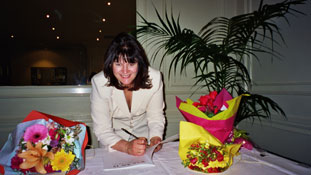Yoga At Home with Jane Wiesner Food for Thought Use the 'next' and 'previous' links at the bottom of the page to browse through this site in sequential order. |
 Jane Wiesner signing copies of her book Who Am I? at the 2003 launch. |
What is Enlightenment? How does one become Enlightened?
The subject of Enlightenment is often viewed as complex. From a yogic perspective, I believe that the definition of Enlightenment is straightforward.
Enlightenment, put simply, is the complete absence of fear.
I believe I have experienced this phenomenon briefly in my lifetime. After a few weeks of rather intense daily meditations I experienced such an overwhelming feeling of trust and fearlessness that it filled me with joy, peace and an incredible sense of clarity. This amazing glimmer of insight created in me a faith in the future that was so clear; so pure that I knew I was totally where I should be—a faith that confirmed, to use Louise Hay's words, that 'all was well in my world'.
Unfortunately, the everyday challenges that we all face continually cloud our minds with worry. But, in reality, apart from real physical threats, our fears are just the result of our beliefs. And, what we believe is ultimately a product of our past experience.
The saying that 'we have nothing to fear but fear itself' is based on this kind of yogic wisdom. In yoga, fear is an illusion. Fear itself creates more fear. Fear keeps us on a cycle of conditionality or samsara (a conditioned existence). Conditionality defined is: 'conditional thoughts that arise from events that then condition future events' (Peter Fenner 1987).
Fear stops us from moving forward. It clouds the mind and colours our interpretative filter—the emotional lens we use to see the world.
Enlightenment is liberation from the 'pull of the past'.
Namaste (saluting the light in you),
Jane Wiesner
Principal of the Body and Mind School of Yoga
Read other issues of 'Food for Thought':


